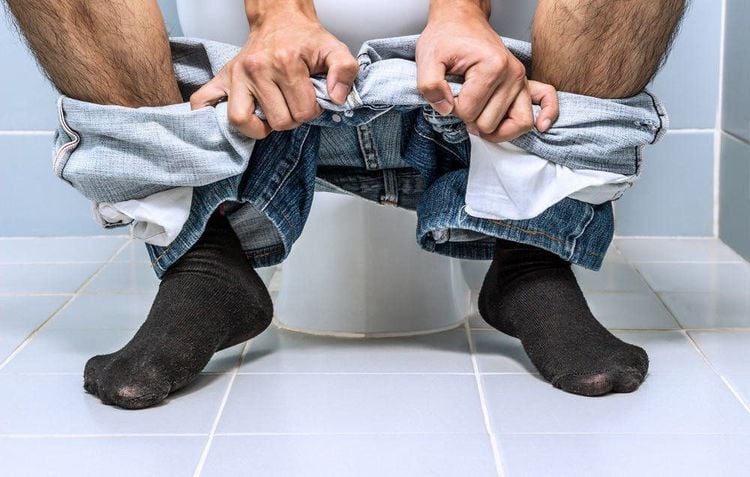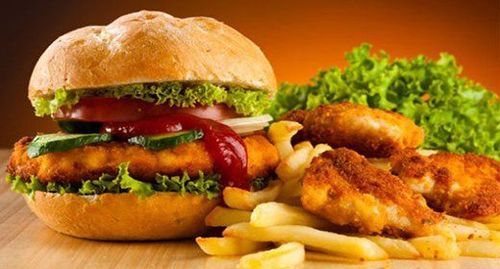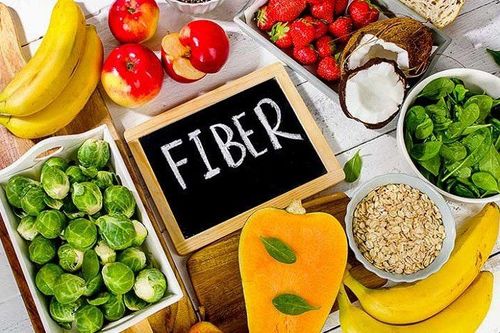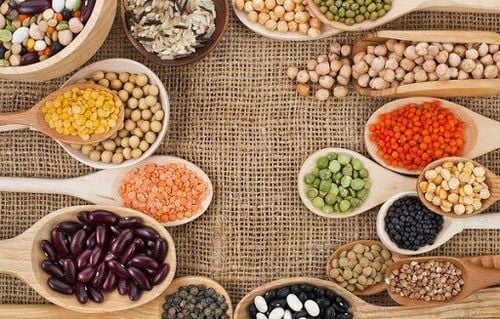This is an automatically translated article.
Posted by Doctor, Doctor Phan Nguyen Thanh Binh - Head of Department of Nutrition - Dietetics - Department of Pediatrics - Neonatology, Vinmec Central Park International General Hospital
A grimace, harsh words that are hard to hear are often called "constipated face" or "constipated person's words". So have you ever wondered: "How does constipation affect health?"
1. Who is prone to constipation?
Constipation is delayed bowel movements, usually less than 3 times a week, or hard, dry stools. People with constipation often experience difficulty or pain with bowel movements as well as other disturbances such as discomfort, bloating, vomiting, loss of appetite, and general fatigue. There are many people who think it is necessary to have a bowel movement every day, however, there is no standard frequency for this problem. A normal digestive system can have bowel movements from 3 times/day to 3 times/week with softer or tighter stools depending on the person.
In fact, constipation is not a disease but a syndrome. Except for a few medical-related causes, the most common causes are a low-fiber diet, not drinking enough water, and being sedentary.
Currently, constipation is one of the common digestive disorders, especially in developed countries. In Vietnam, although there are no specific statistics, the number of people complaining about constipation is very large. Children are prone to constipation due to not drinking enough water, foods are often low in fiber or high in protein. Children also often hold back bowel movements because they are too busy playing or are not used to going to public toilets. Constipation in the elderly is often caused by the use of soft foods, low in fiber, and drinking less water. The main cause of this condition is reduced chewing ability, decreased thirst and appetite when high. year old. Pregnant and breastfeeding women are also more prone to constipation due to hormonal changes or the baby's pressure on the rectum. Occupations with few opportunities for movement such as those who have to work a lot with computers, drive cars, etc. also have a very high risk of constipation.

Táo bón làm ảnh hưởng nghiêm trọng đến chất lượng cuộc sống của bạn
The industrial age keeps everyone busy and stressed. We rush with fast, energy-rich meals that lack fiber. The fruit is carefully peeled for fear of preservative chemicals and is also replaced with convenient vitamin tablets. Caffeinated drinks such as energy drinks, soft drinks such as coffee, coca-cola,... are widely used. Modern facilities such as televisions, washing machines, dishwashers, elevators, cars, cell phones, etc. make us less active. All of which contribute to an increased risk of constipation.
Constipation is a common syndrome for most people. The subjects prone to constipation are children, the elderly and pregnant and lactating women. A modern lifestyle with a low-fiber, sedentary diet also contributes significantly to the increased risk for this syndrome.
2. Consequences of Constipation
Regardless of the cause of constipation, in a short time, the patient will feel tired, sluggish, lethargic, uncomfortable and frustrated in the body, not eating well, poor health,. .. It is caused by feces and gas remaining in the intestines, not excreting through the anus, filling the abdomen, discomfort, nausea, .... Children with constipation are often accompanied by anorexia because they do not feel hungry, Adults do not want to eat because eating feels more upset and uncomfortable. Long-term storage of feces in the intestines can cause abdominal distension or bowel obstruction due to feces, making the situation worse. In addition, toxins in feces such as phenol, ammonia, indol, ... are created during the digestion of food and are broken down by anaerobic bacteria. Once accumulated in the intestines for a long time, these substances are absorbed into the bloodstream and then spread throughout the body leading to chronic toxicity.

Chán ăn, ăn không ngon là triệu chứng thường gặp ở người bị táo bón
Feces in the intestines and toxic substances entering the blood also cause nervous stimulation that affects the patient's mood and spirit, making them always feel frustrated and uncomfortable just waiting for their body to heal. "boom" association. Chronic poisoning also makes the patient's skin pale, lips pale, fingernails pale.
Constipation often makes the elderly or people in poor health weaker and makes the condition of people with chronic diseases worse.
Constipation prevents stools from being passed. Water and minerals leave the stool and enter the bloodstream, causing the stool to become dry and hard. Constipation for a long time causes stools to become dry and hard, making the anal ring unable to push stool through. If you try to push, you will tear the anus, bleed, protrude hemorrhoids, ... Constipation is considered the cause of hemorrhoids and rectal prolapse.
People with constipation, when having a bowel movement, have to use force to push to increase blood pressure. For the elderly, patients with high blood pressure, cardiovascular disease, constipation is very dangerous because it can increase the risk of cerebral vascular occlusion or cerebral hemorrhage.
Long-term constipation can cause rectal cancer. Constipated stools often contain higher concentrations of toxins and carcinogens such as deoxycholic acid, lithocholic acid and nitroso compounds (NOCs) than normal human feces due to their dry and hard nature. In addition, feces that remain in the rectum for a long time increases the contact time with the lining of the rectum, so it is easy to cause cancer. A study in Greece found that the risk of colon and rectal cancer in people with a low-vegetable, high-meat diet was eight times higher than in those who ate a low-veggie diet.
When the stool stays in the intestine for a long time, the water in the stool still oozes around the stool, causing the stool to leak out involuntarily, confusing it with diarrhea.
Long-term constipation not only makes the patient painful and uncomfortable, but also makes the large intestine weak, dilated and at risk of bowel perforation. Constipation also increases pressure in the intestines, making the patient more susceptible to appendicitis, increasing the risk of hemorrhoids, rectal cancer....

Táo bón có thể gây trĩ nếu không được điều trị dứt điểm
3. Causes of Constipation
Causes of constipation are as follows:
Low fiber diet: The most common cause. Currently, both children and adults eat too many processed foods that eliminate fiber. Eating soft, low-fiber foods is the main cause of constipation in the elderly. The main reason for this condition is decreased chewing ability and decreased appetite. The recommended requirement is 20-35g of fiber/day/adult. The Vietnam Nutrition Institute recommends that each person eat 300-500g of vegetables/day. Not drinking enough water: Water increases the volume and softens the stool, making it easier to pass. Some types of water such as coffee, caffeinated soft drinks seem to have a dehydrating effect. movement event.

Thức ăn nhanh là nguyên nhân dẫn đến táo bón ở trẻ nhỏ
Pharmaceuticals: Pain relievers, especially narcotics, aluminum-containing antacids, antispasmodics, antidepressants, iron supplements, drugs. Diuretics and anticonvulsants can slow bowel movements. Irritable bowel syndrome causes contractions that interfere with bowel movements. Diarrhea and constipation often alternate in people with this syndrome. Symptoms such as abdominal cramps, bloating, and discomfort are also common. IBS is often worse when the person is under stress. Changes in daily life and habits: Constipation can be caused by hormonal changes or by the pressure on the intestines of the fetus during pregnancy; due to decreased intestinal motility in the elderly; due to changes in residence or daily routines while away.

Thói quen sử dụng thuốc nhuận tràng làm tăng nguy cơ bị táo bón
Laxative abuse: Using laxatives can lead to habit formation. Over time, laxatives and enemas can damage the nerve cells of the intestines, affecting the bowel's contractions and bowel movements. Abstaining from defecation due to unwillingness to use public toilets or due to being too busy at work, playing in children... is often the cause of constipation. Special diseases: neurological disorders, endocrine and metabolic disorders, ... Digestive system dysfunctions: intestinal obstruction, intestinal adhesions, appendicitis, tumors, intestinal stenosis, ... ...
3. Treatment and prevention of constipation
Treatment of constipation depends on many factors such as cause, severity, duration,... but in most cases, the right diet and lifestyle changes help cure smoke and prevent constipation Effective
Eat enough fiber: (20-35 g / day) or 300g vegetables / day. Fiber is not digested and absorbed in the small intestine, but it can be fermented in the large intestine and absorb water, making stool soft and spongy, helping to laxative. Fiber is often found in vegetables, fruits, whole grains, and legumes. Drink enough water: 6-8 glasses a day, help soften stools. It is best to drink water in the morning. Fruit juices, vegetable juices, liquid soups are also very good sources of water for the body. In addition to softening and increasing stool volume, drinking water, especially in the morning, also stimulates bowel movements, making bowel movements easier (oral-anal reaction) Daily exercise: Regular exercise helps increased intestinal motility. Create a good habit of bowel movements and do not hold back when this need arises

Tăng cường chất xơ giúp ngăn ngừa tình trạng táo bón
4. Fiber in the prevention of constipation
Dietary fiber is the edible parts of plants that are not digested and absorbed by the body in the small intestine but are fermented partially or completely by bacteria residing in the human large intestine. Dietary fiber does not directly provide energy and nutrients, but performs many biological functions.
Depending on water-soluble properties, people divide fiber into 2 types: soluble fiber and insoluble fiber. Soluble fibers include pectin, gum, oligofructose, agar, beta-glucan. Insoluble fibers include cellulose, lignin, and some hemicellulose.
Dietary fiber is found in many plant sources, especially in fruits, vegetables, whole grains, and legumes. These sources both contain both soluble and insoluble fiber. Most plants contain more insoluble fiber than soluble fiber (Insoluble fiber accounts for 50-75% of total fiber compared to soluble fiber for 25-30% of total fiber).
Food fiber has 5 properties to help predict the biological effects of fiber: viscosity; water holding capacity; binding of organic molecules; particle size and microbial degradation
laxative: When combined with water, fiber increases fecal mass directly and indirectly through the growth of microbial mass intestinal bacteria. Food fibers with large grain size increase the bulk of the stool more than fibers of small particle size. Adding dietary fiber to the diet not only helps in building fecal bulk, but it also reduces the length of time stools are stored in the large intestine, increases the frequency of bowel movements, and reduces stool hardness, helping to avoid injury. Depending on the type of fiber, the effect of increasing stool mass and increasing frequency of bowel movements is also different.According to Gibsons et al (81), with a dose of 10-20g/day, each gram of oligofructose ingestion adds 1.3g of stool while each gram of inulin ingested increases by 2.0g of stool.Increased frequency of bowel movements increases the rate of excretion of toxins and reduces their concentration.This helps to avoid be at risk of colon cancer .

Chất xơ được tìm thấy trong nhiều loại thực phẩm như ngũ cốc
Other biological effects: Lowers blood cholesterol: Studies show that soluble fibers bind to bile acids in the small intestine, increasing faecal excretion of bile acids. When the amount of bile acid is reduced, the liver will take cholesterol from the blood to make bile acids, thereby reducing blood cholesterol. In addition, a high-fiber diet that is often low in fat also helps prevent heart disease.
Soluble fiber helps stabilize blood sugar in people with diabetes by increasing the time that food stays in the stomach, reducing the rate of sugar absorption in the small intestine.
Dietary fiber prolongs satiety by increasing food volume without adding energy to help prevent overweight and diabetes.
Increases the immunity of the digestive system by increasing the beneficial bacteria in the gut, reducing the risk of gastrointestinal infections.
Constipation is a digestive disorder that almost all of us have experienced. The main cause of this condition is a diet low in fiber, not enough water for the body and lack of exercise. Eating enough fiber, drinking enough water, exercising daily, and creating a bowel habit will help cure and prevent constipation in most cases. A diet with enough fiber also helps reduce the risk of hypercholesterolemia, maintain blood sugar stability, reduce the risk of cardiovascular disease, avoid gastrointestinal infections and overweight and obesity.

Chế độ ăn giàu chất xơ giúp ngăn ngừa nhiều bệnh lý
In order to limit the child's constipation, parents should pay attention to the nutrition that improves the child's resistance. At the same time, add supporting foods containing lysine, essential micro-minerals and vitamins such as zinc, chromium, selenium, B vitamins,... snacks and less digestive problems.
Parents can learn more:
Why do you need to supplement Lysine for your baby?
The role of zinc - Guidelines for reasonable zinc supplementation
Please visit the website Vinmec.com regularly and update useful information to take care of your baby and family.














